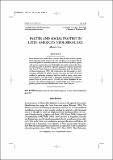| dc.description.abstract |
Prior research has shown that economic liberalization leads to greater levels of protest in the presence of open and democratic politics. Yet the meso-level of political institutions that associate democratic political regimes with protest remain unknown. In this light, the article analyses the effects of political parties on the level of protest using cross-sectional time-series data from 17 Latin American countries beginning with the third wave of democratization in 1978. The results show that the quality of representation embodied in political parties structures the level of societal conflict. In particular, countries with low levels of party system institutionalization and high levels of legislative fragmentation experience greater levels of protest activity. Overall, the article highlights the importance of political institutions in countering the most recent wave of protest against economic liberalization across Latin America. |

